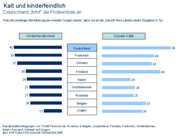Current research, 202
27 December 2007
„"Cold and unfriendly to children!" – The biggest worry of Germans at the turn of the year
In a European comparison, Germany has the highest problem scores.
On a personal level, Germans in 2008 longed for trust, security, and human warmth. However, in the public perception, they increasingly see themselves confronted with neglect, abandonment, and failures in child-rearing. Only at first glance can overwhelmed mothers or incapable parents be explained as a problem of the lower classes. In reality, this reflects the helplessness of a society in which social classes and entire neighborhoods are threatening to drift apart, increasingly living side-by-side rather than together. The percentage of the population that identifies "hostility towards children as their greatest concern for the future" has almost doubled in the last eight years (1999: 221,003 – 2003: 331,003 – 2007: 401,003). The general spread of "social coldness" in Germany is considered even more dramatic (1999: 42% – 2003: 52% – 2007: 58%). This is based on representative surveys in which the BAT Foundation for Future Issues (formerly the BAT Leisure Research Institute) interviewed 2,000 people aged 14 and over in Germany about their concerns about the future.
„We cannot afford an ice age in interpersonal relationships. We need a responsible society in which people take more responsibility for one another,“ says Professor Dr. Horst W. Opaschowski, Scientific Director of the BAT Foundation. According to the futurologist, recent events surrounding child neglect are not a random snapshot: „These developments point to a fundamental social climate change in Germany. Child-friendliness and human warmth are increasingly lost in times of low birth rates.“
Recent representative surveys conducted by the BAT Foundation among 11,000 people in nine European countries also show that Germany "tops the list" of problems. Compared to France, Switzerland, Finland, Italy, Great Britain, Russia, Belgium, and Hungary, the German population complains most about anti-child sentiment and social coldness in their own country (e.g., anti-child sentiment in Hungary: 151,300 – in Germany: 401,300; or: social coldness in Italy: 241,300 – in Germany: 581,300). Such assessments reflect both moods and structures, feelings and living conditions in a country.
Professor Opaschowski: „The willingness to help and the provision of assistance are becoming increasingly important, which also explains why ‚good neighbors’ are being rediscovered in Germany and apartment communities are becoming ‚chosen affinities’ that support and reinforce each other. And many a circle of friends often develops into a ‚second family.’ In this way, the further spread of hostility towards children and human coldness can be prevented.“ So instead of simply asking what the state has failed to do, many citizens feel personally responsible for the common good and the community. This includes, above all, the well-being of children, without whom our society has no future. Whether singles, childless, or small families: they were all once children themselves.




